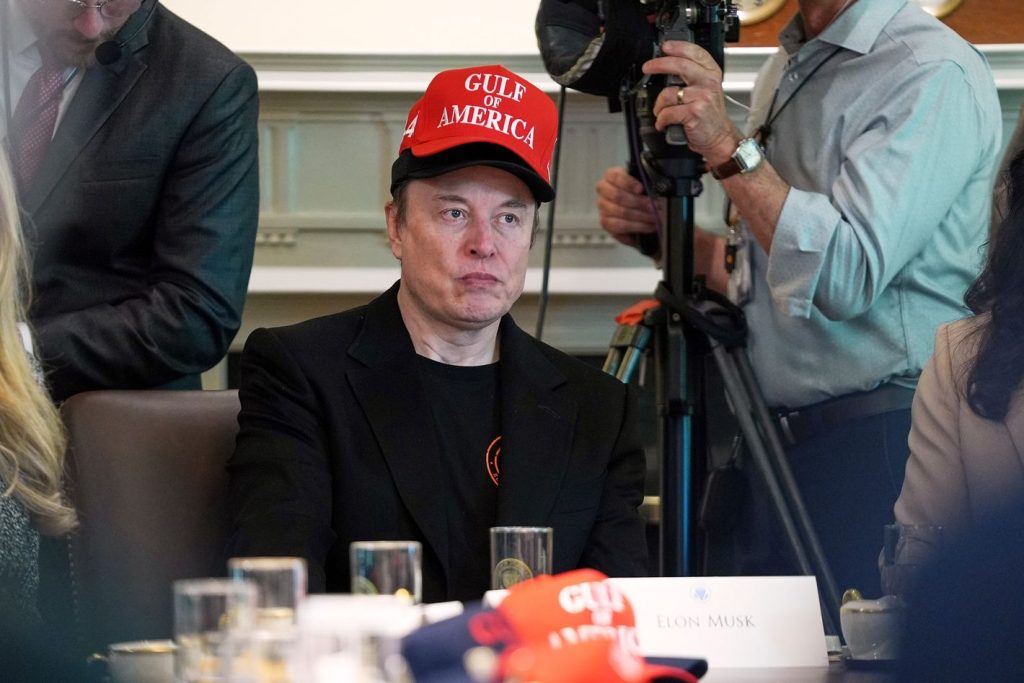Photo: Evan Vucci/AP Photo
It was probably inevitable that Elon Musk, whose live-fast-and-die-young ethic infected his personal invention, the so-called Department of Government Efficiency, would burn out pretty quickly as a Washington power broker. But it’s only now that those who fear and loathe him across the federal government can stop touching wood when they think of his defenestration. Two interviews this week showed he’s somewhere between denial and anger in the stages of grief over his brief career in public service. But there’s probably no turning back, particularly since Musk chose to publicly disrespect Donald Trump’s latest baby, the One Big Beautiful Bill Act of 2025:
Elon Musk says he is “disappointed” by the price tag of the domestic policy bill passed by Republicans in the House last week and heavily backed by President Trump. The billionaire who recently stepped back from running the Department of Government Efficiency, or DOGE, made the remark during an exclusive broadcast interview with “CBS Sunday Morning.”
“I was disappointed to see the massive spending bill, frankly, which increases the budget deficit, not just decreases it, and undermines the work that the DOGE team is doing,” Musk said….
“I think a bill can be big or it can be beautiful,” Musk told CBS News, “but I don’t know if it can be both. My personal opinion.”
Team Trump members in good standing don’t get to have a “personal opinion” about the bill that implements the Boss’s entire legislative agenda. So that’s a sign we aren’t going to see a Musk public-sector comeback in any capacity other than as an extremely successful federal contractor and patronage recipient.
Clearly Musk has some regrets about his DOGE adventure but doesn’t appear to regret his own actions, which made him an intensely hated pariah everywhere he and his Kiddie Nerd band landed throughout the federal bureaucracy. As he told the Washington Post, he believes he was treated unfairly:
“The federal bureaucracy situation is much worse than I realized,” he said. “I thought there were problems, but it sure is an uphill battle trying to improve things in D.C., to say the least.”
He said repercussions over DOGE cuts had been severe. “DOGE is just becoming the whipping boy for everything,” he said. “So, like, something bad would happen anywhere, and we would get blamed for it even if we had nothing to do with it.”
It does not seem to have occurred to Musk that seizing vast powers over federal agencies and personnel in an atmosphere of secrecy and deliberately induced terror might make precise attribution of Bad Things Happening difficult. It’s incredibly difficult to feel sympathy for the world’s wealthiest man, of course. It was widely noted that in using DOGE to blow up federal programs, agencies, and contracts, before figuring out how to remake them, Musk was applying the same takeover tactics he utilized in his own companies, most recently X. Trouble is, he didn’t actually own the federal government, but he acted like he did, which is why DOGE got blamed for everything that went wrong in the early days of Trump 2.0. In addition, there were clear indications that Musk’s ambitions at DOGE went far beyond the bogus “efficiencies” he claimed to pursue, as my colleague John Hermann observed early on:
It’s increasingly clear that Musk and Trump have ambitions for DOGE that extend beyond cuts and into meta-governmental control. It represents, in other words, an all-or-nothing bet on remaking, destroying, or perhaps controlling the government, with a massive potential upside for those involved and correspondingly large risk if they fail.
Even beyond the immediate targets of its self-consciously sinister raids, DOGE and Musk began to embody for many Americans the terrifying potential of AI to literally dehumanize many forms of work. This was always near the front of Musk’s own mind, before and after DOGE, Hermann noted:
The parallels between DOGE’s all-or-nothing bet that it can purge the federal government and the AI industry’s promise to purge humans from wide swaths of the existing private workforce are united in the figure of Musk, a former partner in OpenAI who now runs his own AI firms; to him, the projects are clearly connected, synergistic, and mutually necessary. He’s making this fairly explicit! DOGE is claiming, with few details, to use AI to further its missions, however you might interpret them: AI to replace government work; AI to arbitrarily fire people with a sheen of analysis; “AI” wielded as a broader demoralizing force or conveniently summoned threat to workers.
So few in or near the federal government, ranging from suddenly fired career civil servants to contractors who are getting stiffed on invoices, are going to shed any tears for Musk’s hurt feelings. DOGE will live on in the people he embedded in federal agencies and in the destructive tactics he modeled, which will now undoubtedly be deployed by more adept enemies of the deep state like budget director Russ Vought. He will be gone but never forgotten, and Trump may well threaten to bring him back like a boogeyman used to frighten children into obedience. But the minimum we should ask of Elon Musk is that he refrain from whining and complaining about the unfairness of his critics. When you run around with chainsaws and behave like a cartoon villain, you can’t object when your intended victims enjoy your defeat.

